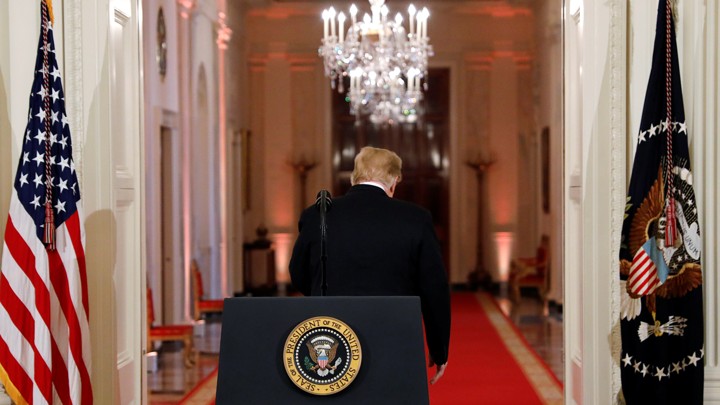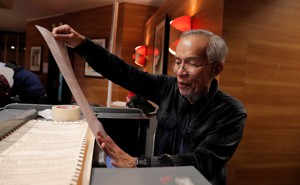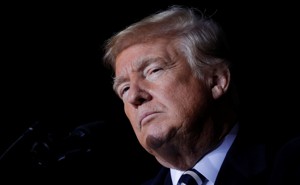Republicans Must Choose Between Trump and the Rule of Law
After Wednesday, elected officials in the Republican Party should have no doubt that Donald Trump will force them to choose in coming days, weeks, and months between loyalty to him and loyalty to the rule of law, between the public’s right to the truth and Trump’s efforts to hide it.
The president began the day with an extraordinary threat on Twitter: “If the Democrats think they are going to waste Taxpayer Money investigating us at the House level,” he wrote, “then we will likewise be forced to consider investigating them for all of the leaks of Classified Information, and much else, at the Senate level. Two can play that game!”
It would be nakedly corrupt to hinge a Senate investigation on partisan game theory or retaliation rather than on the substance of the law and the public interest. Yet the tweet was quickly overshadowed by even bigger news—Trump’s ouster of Attorney General Jeff Sessions.
There’s little question that the resignation was forced for the most illegitimate reason: Trump’s repeatedly, explicitly expressed desire to undermine Robert Mueller’s incomplete investigation, and his open frustration at Sessions’s refusal to help. “We all know this, but it’s worth restating,” the law professor Orin Kerr commented. “The President fired the Attorney General for following ethics rules that required the Attorney General to recuse himself from overseeing an investigation into the President’s campaign and ultimately the President himself.”
Why is there so little doubt about the motive? Sessions was one of Trump’s earliest supporters, continues to share his views on everything from immigration to refugee policy to voting rights to police shootings, and differed significantly only on whether he should’ve recused himself from the probe into foreign election interference.
MORE BY CONOR FRIEDERSDORF
Trump has obsessed about that recusal for months, behind the scenes and in public, stating in August, “Even my enemies say that Jeff Sessions should have told you that he was going to recuse himself and then you wouldn’t have put him in.” More generally, Trump has suggested that an attorney general ought to loyally protect even a lawbreaking president from the legal consequences of his unlawful actions—and Politico reports that his own son now expects to be indicted.
Wednesday’s ouster will put the Mueller probe under the control of new Acting Attorney General Matthew Whitaker, the author of a 2017 CNN articlearguing that Mueller “has come to a red line in the Russia 2016 election-meddling investigation that he is dangerously close to crossing.”
Whitaker reasoned in the article that investigating Trump’s finances “falls completely outside of the realm of his 2016 campaign and allegations that the campaign coordinated with the Russian government or anyone else,” even though Trump Organization finances and business relationships could be relevant if they gave the Russian government leverage over the president, his children, or his associates—or if Trump sought to coordinate with Russia in the realm of politics with the expectation that doing so would benefit his businesses.
In another article, Whitaker argued that Trump was correct to fire James Comey, that “calls for an independent counsel or commission to investigate allegations that Russia tried to interfere with our elections ring hollow when similar calls for special counsels during the scandals of the Obama administration were dismissed,” and that “hollow calls for independent prosecutors are just craven attempts to score cheap political points and serve the public in no measurable way.”
And he has tweeted about the probe, criticizing the raid of Paul Manafort’s house and sharing an article that referred to “the Mueller lynch mob.”
Trump “told advisers that Whitaker is loyal and would not have recused himself from the investigation,” according to The Washington Post. But analysts at Lawfare say Whitaker is obligated to seek the advice of Justice Department bureaucrats about the necessity of recusal:
The relevant Justice Department guideline is Section 45.2 of Title 28 of the Code of Federal Regulations, which states that “no employee shall participate in a criminal investigation or prosecution if he has a personal or political relationship with” either “any person or organization substantially involved in the conduct that is the subject of the investigation or prosecution” or “any person or organization which he knows has a specific and substantial interest that would be directly affected by the outcome of the investigation or prosecution.”Although the regulations do not indicate that Whitaker’s public statements alone necessarily require recusal, Whitaker has other connections to people whose conduct is at issue in the matter. For instance, the regulations definea political relationship as “a close identification with an elected official, a candidate (whether or not successful) for elective, public office, a political party, or a campaign organization, arising from service as a principal adviser thereto or a principal official thereof.”Rebecca Ballhaus of the Wall Street Journal reports that Whitaker chaired the 2014 Iowa state treasurer campaign of Sam Clovis, who went on to serve in the Trump campaign and administration and who, Ballhaus notes, is now a grand jury witness in the Mueller investigation. The Des Moines Register reported Whitaker’s chairmanship of Clovis’s campaign during the campaign itself. What’s more, in a text message to Ballhaus after Whitaker’s appointment, Clovis wrote that he was “proud of my friend,” referring to Whitaker, raising the question of whether there is a personal relationship as well.There is an important process point here: Under the same Justice Department regulation mentioned above, Whitaker is obligated to seek guidance from career ethics attorneys regarding whether he should recuse. This is the process Jeff Sessions used in determining that the rules required that he recuse, and Deputy Attorney General Rod Rosenstein also sought guidance regarding his obligations, though Justice officials determined that his recusal was not required. If Whitaker either does not obtain an ethics opinion from career officials or if he departs from that guidance, that would be a serious red flag.
Will Republicans protect the Mueller investigation as Trump gains new visibility into what the special counsel has been up to all this time?
Mitt Romney, now the senator-elect from Utah, stopped short of calling for Whitaker to recuse himself, but said it is “imperative that the important work of the Justice Department continues” and the Mueller probe “proceeds to its conclusion unimpeded.”
The Maine Republican Susan Collins also stated that “it is imperative that the administration not impede the Mueller investigation,” adding that she is concerned that “Rod Rosenstein will no longer be overseeing the probe,” and that “Special Counsel Mueller must be allowed to complete his work without interference—regardless of who is AG.”
And GOP Senator Lamar Alexander said the Mueller investigation will continue.
Most other Republicans have kept quiet. Who wants to make an enemy of the White House, Fox News, Rush Limbaugh, and those in the GOP base who believe Trump can do no wrong?
But if Trump or Whitaker takes steps to impede the Mueller investigation or fights to prevent House Democrats, with their new subpoena power, from delving into matters Trump would like to keep secret, elected Republicans won’t be able to avoid taking a position forever.
They will have to choose between angering the president and his populist backers and becoming complicit in whatever Trump is hiding, knowing that the president seldom stays loyal to anyone for very long, and that if and when the truth comes out, the public will rightfully hold them accountable if they helped conceal illegal or flagrantly immoral behavior.
Would you want to publicly help Trump fight to keep his closet doors shuttered, not knowing what skeletons lurk inside to one day be revealed?
We want to hear what you think about this article. Submit a letter to the editor or write to letters@theatlantic.com.
CONOR FRIEDERSDORF is a staff writer at The Atlantic, where he focuses on politics and national affairs. He lives in Venice, California, and is the founding editor of The Best of Journalism, a newsletter devoted to exceptional nonfiction.






5 comments:
Boy, were you wrong about the entire Mueller investigation. The President was framed and we almost had our government overthrown. Thank you for printing this comment.
Boy were you wrong regarding the entire Mueller investigation. Our President was framed and our government nearly overthrown. Thank you for allowing me to print this comment.
Boy were you wrong regarding the entire Mueller investigation. Our President was framed and our government nearly overthrown. Thank you for allowing me to print this comment.
Boy were you wrong regarding the entire Mueller investigation. Our President was framed and our government nearly overthrown. Thank you for allowing me to print this comment.
John, you're both repetitive and wrong. I forgive you for your chauvinistic Philistinism. We in the reality-based community know the facts. The American people, in our righteous wrath, will rise up and defeat the pretender, the bully, the bigoted DONALD JOHN TRUMP. He belongs in the ashcans of history,
Post a Comment